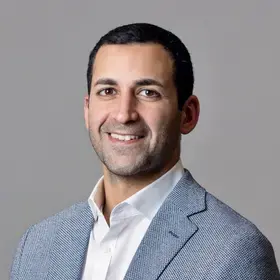David Forbes got his start in construction thanks to the family business. “We used to buy houses and renovate them. My dad was really adamant that my siblings and I needed to know and understand everything that went into a house.” Later, he took his interest in construction and real estate to Jones Lang LaSalle, which worked on the Goldman Sachs and Deutsche Bank accounts. At Jones Lang LaSalle, he became an operational engineer servicing Goldman Sachs and later became an assistant chief of engineering. While working at 85 Broad Street, he lived through one of the most traumatic experiences in New York City’s history – 9/11.
Having surmounted the challenges at Goldman Sachs, he later worked on the Deutsche Bank account and ultimately worked for the engineering or operations departments at Columbia University and beyond. He says that he completed his entire education thus far at night, while working full-time. In fact, he worked towards his Executive M.B.A. at Pace at the same time that he was earning his M.S. in Construction Administration at Columbia.
He credits Columbia with providing the training that took his career to the next level. He is now the director of operations at FM Facility Maintenance in Hartford, CT, a facilities maintenance management company, where he oversees over 10,000 locations. He says that the Columbia name has certainly opened doors for him, but it is clear from his astuteness and his animated demeanor that his own drive and resilience has propelled him just as much.
You were working [at Goldman Sachs near the World Trade Center] on 9/11. How did you deal with the aftermath of that event, from a maintenance and construction perspective?
That was a really interesting, traumatic, amazing experience. It started around 8:30 a.m. on Tuesday. Once the first plane hit, I started getting worried. We all went up to the roof and took a look at what was going on, and the next thing you knew, we had another plane hitting the next building.
The Goldman network is a global network. We had about 15 buildings down there. There were a couple of things we had to verify: 1. Whether the structural integrity of all these facilities was sound, and 2. At 130 Liberty, [was] this building going to topple? In New York City, you have so many skyscrapers, you don't know whether, if one falls, it will hit another building and create a domino effect.
It was pulverized debris, but it looked like a snowstorm. The smell and the experience are two things I will never forget.
You were working full-time while earning your undergraduate degree and then your advanced degrees. Can you tell us about that?
I was already working, yeah. [At Columbia,] I was the director of client services, then I became the director of physical plant engineering operations. That's when I started to do my master's. I earned an Executive M.B.A. [at Pace University] and the M.S. in Construction Administration program [at Columbia University] at night. I was doing those two programs at the same time.
What do you think was valuable about the M.S. in Construction Administration program?
I definitely think that the training was worthwhile. My main client trusts us to manage their budget. We make the primary decisions about whether an expense that may be incurred is a worthwhile expense or not. I refer to my pricing strategy lessons. I think about the estimating classes that I did here. Whether it's RS Means or other reference points, I draw from that all the time. There's no doubt that what I learned in this Construction Administration program – every class translates to the real world.
I’m here on campus today because I’m hiring two people right now [from the program]. When we recruit here or elsewhere, I go to the universities that have a Construction Administration or a real estate program where you can get folks who have good fundamentals.
What do you do at your current role?
I’m the operations director at a company called FM Facility Maintenance. We're somewhere around $700 million in sales. We manage approximately 60,000 retail properties throughout the U.S. and Canada. I manage about 10,500. My job is also to build business, build revenue, and run the construction program.
Is there anything else you wanted to mention about your job or the industry?
Not a lot of people realize how lucrative this industry is. If you come out of Columbia with a master’s degree, if you're a go-getter and you're proactive, there’s no reason you can't be a senior vice president or managing director. Whatever you invest in your education, it will pay itself back within the first two or three years. I would encourage all those who are going to school to stay the course, stay focused.
Education is not a destination, it's a journey. It's painful, but when you start to achieve some success and you know a little bit more than you did yesterday, for me, that's pretty exciting.


